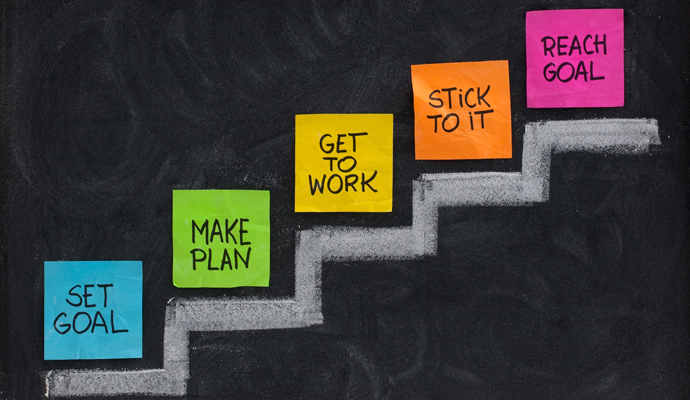8 ways a simple notebook can change your life
Want to stick to goals, get happier, and improve your relationships? Get a notebook.

A free daily email with the biggest news stories of the day – and the best features from TheWeek.com
You are now subscribed
Your newsletter sign-up was successful

Go buy a notebook
Many people have written to me saying they love all the research on bettering themselves but need that first step on how to shoehorn it in to their day-to-day life.
Incorporating a lot of the blog's strategies can be as easy as buying a notebook.
The Week
Escape your echo chamber. Get the facts behind the news, plus analysis from multiple perspectives.

Sign up for The Week's Free Newsletters
From our morning news briefing to a weekly Good News Newsletter, get the best of The Week delivered directly to your inbox.
From our morning news briefing to a weekly Good News Newsletter, get the best of The Week delivered directly to your inbox.
(No, it doesn't need to have glitter on it or say "MY SECRET DIARY" on the front.)
Others might think: "I don't need to write stuff down. Reading is enough."
Nope.
A lot of research shows your brain sees writing differently than thinking or talking.
A free daily email with the biggest news stories of the day – and the best features from TheWeek.com
Writing forces you to organize and clarify your thoughts. You learn better when you write things down and are more likely to follow through.
So what should you be writing in this notebook?
1) Write down what you're looking forward to
People who devote time to anticipating fun experiences are happier.
So at least once a week, make plans, write them down, and when you need a boost, look at the great things you have coming up.
From Shawn Achor's The Happiness Advantage:
One study found that people who just thought about watching their favorite movie actually raised their endorphin levels by 27 percent. Often, the most enjoyable part of an activity is the anticipation. If you can't take the time for a vacation right now, or even a night out with friends, put something on the calendar — even if it's a month or a year down the road. Then whenever you need a boost of happiness, remind yourself about it. [The Happiness Advantage]
2) Write down your progress
Want to know your strengths and weaknesses? Make predictions, write them down, and compare against results.
This is an excellent way to see where your natural abilities are and if you're improving.
From management guru Pete Drucker:
The only way to discover your strengths is through feedback analysis. Whenever you make a key decision or take a key action, write down what you expect will happen. Nine or 12 months later, compare the actual results with your expectations… Look for patterns in what you're seeing: What results are you skilled at generating? What abilities do you need to enhance in order to get the results you want? What unproductive habits are preventing you from creating the outcomes you desire? In identifying opportunities for improvement, don't waste time cultivating skill areas where you have little competence. Instead, concentrate on — and build on — your strengths. [Harvard Business Review]
Making notes about your preferences and experiences can help you turn your notebook into a personal handbook.
You'll know yourself better and be able to make better decisions if you record your feelings and expectations when things happen.
3) Write down your goals

You're more likely to follow through on things that you write down. Writing down obstacles and how you'll address them increases levels of hope — and success.
Writing about your goals can make you happier and even healthier:
Writing about life goals was significantly less upsetting than writing about trauma and was associated with a significant increase in subjective well-being. Five months after writing, a significant interaction emerged such that writing about trauma, one's best possible self, or both were associated with decreased illness compared with controls. [Personality and Social Psychology Bulletin]
Everybody knows they should write down goals and everyone has goals but no one does it. Why?
They take it too seriously and they're afraid. Don't sweat it. Just jot them down. Goals can change but in the meantime they will help guide decisions when you're stuck.
4) Write down your ideas
Many of the great geniuses all kept notebooks. Why? Their ideas rarely, if ever, exploded out as one big EUREKA!
They developed over time and that evolution needed to be recorded and shaped.
Creativity started with the notebooks' sketches and jottings, and only later resulted in a pure, powerful idea. The one characteristic that all of these creatives shared — whether they were painters, actors, or scientists — was how often they put their early thoughts and inklings out into the world, in sketches, dashed-off phrases and observations, bits of dialogue, and quick prototypes. Instead of arriving in one giant leap, great creations emerged by zigs and zags as their creators engaged over and over again with these externalized images. [Zig Zag: The Surprising Path to Greater Creativity]
Got an idea? Good one? Mediocre one? Doesn't matter. Write it down. Many times those mediocre ones become good ones with work.
5) Write down your anxieties
Research shows writing about your worries can calm you and even increase performance:
…for students given the opportunity to write before the exam, those highest in test anxiety performed just as well as their less anxious classmates. "Writing about your worries for 10 minutes before an upcoming exam leveled the playing field such that those students who usually get most anxious during exams were able to overcome their fears and perform up to their potential," Beilock said. [Eureka Alert]
Projects at work bothering you long after you leave the office? Write down a plan for how to deal with them before you leave.
Research shows talking to someone after a traumatic event doesn't help. But writing about it does.
Designating a time to worry can actually be a great strategy, funny as it sounds. And write those worries down to put them to rest.
6) Write about your relationship
Writing about relationships improves relationships:
Writing about emotional experiences is associated with a host of positive outcomes. This study extended the expressive-writing paradigm to the realm of romantic relationships to examine the social effects of writing. For 3 consecutive days, one person from each of 86 dating couples either wrote about his or her deepest thoughts and feelings about the relationship or wrote about his or her daily activities. In the days before and after writing, instant messages were collected from the couples. Participants who wrote about their relationship were significantly more likely to still be dating their romantic partners 3 months later. [Psychological Science]
7) Write down the good things that happen to you

Long time readers have heard me beat the drum on this one a million times. (Which makes me wonder: Have you guys ever actually tried it?)
Professor Martin Seligman at the University of Pennsylvania, who developed the technique, refers to it as three blessings. It's been shown again and again to help people improve their outlook.
Seligman explains it in his book Flourish: A Visionary New Understanding of Happiness and Well-being:
Every night for the next week, set aside ten minutes before you go to sleep. Write down three things that went well today and why they went well. You may use a journal or your computer to write about the events, but it is important that you have a physical record of what you wrote. The three things need not be earthshaking in importance (" My husband picked up my favorite ice cream for dessert on the way home from work today"), but they can be important (" My sister just gave birth to a healthy baby boy"). [Flourish: A Visionary New Understanding of Happiness and Well-being]
Next to each positive event, answer the question "Why did this happen?"
Give it a shot. Only takes a minute every night.
8) Write down your story
Reinterpreting your life events into a story, from a new perspective, can not only change how you see your life, but change how you behave going forward.
Timothy Wilson, author of Redirect: The Surprising New Science of Psychological Change, talks about how the process of "story-editing" can help us improve our lives:
I call the first "story prompting," whereby people are given information that prompts them to change the way they view themselves and the causes of their behavior. An example is a study I did with college students many years ago (Journal of Personality and Social Psychology, 1982). The participants were first-year students who weren't doing well academically. As part of what they thought was a survey, they read information suggesting that many college students do poorly at first but improve over time. We also showed the students videotaped interviews of juniors and seniors who reinforced this message. In other words, we prompted students to reinterpret their academic problems from a belief that they couldn't cut it in college to the view that they simply needed to learn the ropes. The students who got this prompt — compared to a control group that didn't — got better grades the next year and were less likely to drop out. [APA]
Time to get a notebook.
Join 100K+ readers. Get a free weekly update via email here.
More from Barking Up The Wrong Tree...
-
 How the FCC’s ‘equal time’ rule works
How the FCC’s ‘equal time’ rule worksIn the Spotlight The law is at the heart of the Colbert-CBS conflict
-
 What is the endgame in the DHS shutdown?
What is the endgame in the DHS shutdown?Today’s Big Question Democrats want to rein in ICE’s immigration crackdown
-
 ‘Poor time management isn’t just an inconvenience’
‘Poor time management isn’t just an inconvenience’Instant Opinion Opinion, comment and editorials of the day